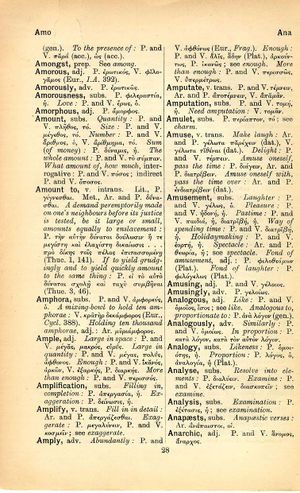amuse: Difference between revisions
From LSJ
μελετᾶν οὖν χρὴ τὰ ποιοῦντα τὴν εὐδαιμονίαν, εἴπερ παρούσης μὲν αὐτῆς πάντα ἔχομεν, ἀπούσης δὲ πάντα πράττομεν εἰς τὸ ταύτην ἔχειν → one must practice the things which produce happiness, since if that is present we have everything and if it is absent we do everything in order to have it | so we must exercise ourselves in the things which bring happiness, since, if that be present, we have everything, and, if that be absent, all our actions are directed toward attaining it
mNo edit summary |
m (Woodhouse1 replacement) |
||
| Line 1: | Line 1: | ||
{{Woodhouse1 | {{Woodhouse1 | ||
|Text=[[File:woodhouse_28.jpg|thumb|link={{filepath:woodhouse_28.jpg}}]] | |Text=[[File:woodhouse_28.jpg|thumb|link={{filepath:woodhouse_28.jpg}}]] | ||
===verb transitive=== | |||
[[make laugh]]: Ar. and P. γέλωτα [[ | [[make laugh]]: [[Aristophanes|Ar.]] and [[prose|P.]] [[γέλωτα παρέχω]], [[γέλωτα παρέχειν]] (dat.), [[verse|V.]] [[γέλωτα τιθέναι]] (dat.). | ||
[[delight]]: P. and V. [[τέρπω | [[delight]]: [[prose|P.]] and [[verse|V.]] [[τέρπω]], [[τέρπειν]]. | ||
[[amuse oneself]], [[pass the time]]: P. διάγειν, Ar. and P. διατρίβειν. | [[amuse oneself]], [[pass the time]]: [[prose|P.]] [[διάγειν]], [[Aristophanes|Ar.]] and [[prose|P.]] [[διατρίβειν]]. | ||
[[amuse oneself with]], [[pass the time over]]: Ar. and P. ἐνδιατρίβειν (dat.). | [[amuse oneself with]], [[pass the time over]]: [[Aristophanes|Ar.]] and [[prose|P.]] [[ἐνδιατρίβειν]] (dat.). | ||
}} | }} | ||
Revision as of 09:16, 20 May 2020
English > Greek (Woodhouse)
verb transitive
make laugh: Ar. and P. γέλωτα παρέχω, γέλωτα παρέχειν (dat.), V. γέλωτα τιθέναι (dat.).
delight: P. and V. τέρπω, τέρπειν.
amuse oneself, pass the time: P. διάγειν, Ar. and P. διατρίβειν.
amuse oneself with, pass the time over: Ar. and P. ἐνδιατρίβειν (dat.).

